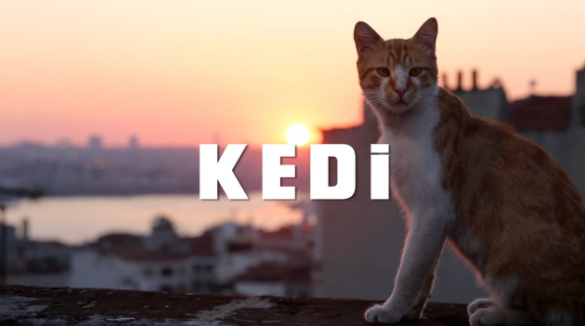There is a god-like way to how animals are treated in Istanbul, especially, it seems in Ceyda Torun’s first feature-length film, Kedi. Paying homage to the ceaseless number of cats that have and will probably always populate the city when humans are stamped out by their own pettiness, Kedi divides the feline into seven unique archetypes (it’s sort of like The Real World but with cats): Sari, “the hustler,” Bengü, “the lover,” Psikopat, “the psycho,” Deniz, “the social butterfly,” Aslan Parçasi, “the hunter,” Duman, “the gentleman,” and Gamsiz, “the player.”
Of course, each cat embodies one or other of these nickname traits at certain moments in the documentary, but the point is, they’re all, like people, extremely distinct, set in their ways and simply trying to survive on any kindness that comes their way–especially in a sweeping metropolis like Istanbul, which, by the way, is its own character in the film. And though the constant news reports of random explosions fueled by terrorist attacks have made the city somewhat unpopular as a go-to destination (at least for more lily-livered Americans) of late, Kedi is sure to reinvigorate some interest in the ancient capital.
For those who are “dog people,” let it be known there’s a bit of discrimination and nepotism in the film, as one of the cat’s occasional owners–though none of them can really be owned, just as Holly Golightly says–remarks, “Cats are aware of god’s existence, while dogs think people are god. Cats don’t.” And take advantage of this knowledge they do–perhaps even more than U.S. fat cats (i.e. in the classist The Secret Life of Pets). Duman, for instance, is fed a gourmet diet of manchego cheese and turkey every day merely by pawing at the window until someone in the restaurant brings him his meal. It’s a classic case of human acting as servant to beast in spite of us thinking it’s the other way around.
In truth, the stray cats of Istanbul are the unsung heroes of the city, saving the likes of a local man who says he was too depressed to laugh or find purpose at one point until discovering a gaggle of felines to care for. And, unlike in the U.S., there is no stigma to being a “crazy cat lady,” as one woman with an apartment full of them explains that she’s healing her wounds through theirs. It is this theme that reappears time and time again throughout Kedi: that there is an energy to cats capable of absorbing all the negative vibes emanating from a person into themselves, and out into the ether. Plus, they’re really good at rat-catching–a fact that goes back to their ancient history in Istanbul when every household had a cat to protect against sewer rodents. A cat must still earn his keep, after all.
And even if you’re not one of those types to get mushy over the sight of cats, Kedi at least offers a stirring tourism ad for Istanbul, in all its simplicity and beauty–graceful as a feline and as serene-feeling as kedi-mine.




















